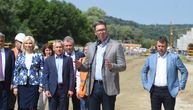Third authorities-opposition meeting on election conditions dedicated to media (VIDEO, PHOTO)
Media associations and organizations monitoring elections presented their findings and recommendations on the topic, "Access to Media and Their Control"
The third roundtable on electoral conditions is being held at the Faculty of Political Sciences (FPN) in Belgrade on Monday.
Representatives of political parties and alliances, media associations, non-governmental organizations and university professors are discussing the situation in the media in Serbia.
10:45 - THE MEETING CONTINUES BEHIND CLOSED DOORS
After representatives of media associations and NGOs presented their recommendations, the meeting continued behind closed doors.
Participants are expected to address reporters around 12:30 pm.
10:20 - RECOMMENDATIONS OF MEDIA REPRESENTATIVES
The meeting was also addressed by Stevan Ristic on behalf of the Media Association, Dragan Janjic from the Independent Association of Journalists of Serbia (NUN) and Stojan Markovic from Local Press.
Stevan Ristic said that weekly magazines have no access to advertisers, citing the weekly Vreme as an example, whose contracts with public companies have been terminated.
Ristic specifically mentioned the issue of the Tanjug news agency, namely its deletion from the Media Register, and urged carrying out all necessary procedures related to the daily Politika.
Dragan Janjic said there was a long-standing trend of increasing threats against journalists, while the situation in society is such that attacks against journalists are commented on depending on what media they work for, that is - not everyone is treated the same.
"This regrettable situation in the media is a product of a long-standing trend and will not be solved by applying cosmetic solutions before the elections - major and serious changes are needed," said Janjic.
"Our message to everyone is - look to create conditions in which the broadest sections of the population will have equal access to information," said Janjic, stating that NUNS has provided its analyses and data and would not participate in the closed part of the meeting.
Stojan Markovic said that he saw, as a lead up to the 2020 elections, discrimination of media outlets based on dissemination of information and the money flow, pressure on editorial policies, bans on attending (news) conferences and the absence of invitations, as well as accelerated announcements of tenders for co-financing of media content as a form of hidden financing.
10:10 AM - NGOs' RECOMMENDATIONS ON MEDIA
NGOs' recommendations reagrding the media were presented by Bojan Klacar, executive director of CeSID. He proposed six measures that could be implemented before the elections without changing the law and four measures that would require legal intervention.
Klacar said that the first measure was to set up a Supervisory Board in the Serbian Assembly, then conduct coherent and comprehensive media monitoring, make the pricing of political advertising public, which in addition to media actors also requires the involvement of the Anti-Corruption Agency and launching a procedure for nominating new REM members, because this regulatory body for electronic media now operates in incomplete composition, with six of its nine members.
"The next recommendation is to define short and clear deadlines in the REM statute for deciding on complaints and to inform the public once every 15 days how the body had acted on complaints," said Klacar, adding that the sixth measure was to adopt a new Rulebook on Media Providers.
"We believe that it would be a good idea to sanction media outlets that violate electoral silence and to open the issue of shortening the electoral silence period," said Klacar.
Klacar also said it would be good to make it clear in new media laws that REM has an obligation to monitor the media during the election campaign, and to change the law on political advertising.
Nemanja Nenadic, Transparency Serbia program director, spoke next. He said that 22 problems have been presented, divided into four thematic units.
"We don't have a single state body with jurisdiction to monitor equal representation in either print or electronic media," said Nenadic, adding that REM is in charge of electronic media.
"We have a problem with advertising in the media, paid and unpaid forms of promotion," said Nenadic, citing as an example direct broadcasts of party rallies, and adding that this practice should be banned because it is not accessible to everyone under the same conditions.
Nenadic pointed out that there is a systemic problem when it comes to advertising prices, and above all payments, as well as the issue of state advertising.
"Something must be done to make the monitoring data carried out by REM publicly available," said Nenadic, adding that it cannot be accessed even at the request of the commissioner (for public information).
Rasa Nedeljkov from CRTA said that the biggest problems concern the misuse of public resources and access to the media.
He cited the example of the monitoring of TV outlets with national coverage during the local elections in Belgrade, where there was a large imbalance in presenting the candidates - four to one in favor of the authorities.
Nedeljkov also asked that REM should be deciding on every complaint, explaining its decisions, and making them public.
10:04 am - ANTONIJEVIC OPENS THE MEETING
The third meeting between the authorities and the opposition on electoral conditions was opened by Milan Antonijevic of the Open Society Foundation. He said the issue of media was one of the most important in a pre-election period.
Antonijevic informed the participants that a letter had arrived from Kanal 9 owner Maja Pavlovic, who has been on a hunger strike for days.
Antonijevic said the gathering was representative and thanked the media for covering it, recalling that the second part of the meeting would be closed to the public.
FPN Dean Dejan Simic said that elections are the core of political events and a yardstick for legitimacy and legality of a society, while equal access to the media is "the core of the core."
"Elections are the neuralgic core, a measure of tlegality and legitimacy of the political process. Equal access to the media afforded to everyone is the core of the core, the essence of a democratic political order," said Simic.
10:00 AM - PARTICIPANTS ENTER THE ROOM
The meeting is expected to begin. Also in the hall are Miroslav Aleksic, deputy chairman of the People's Party, Tomislav Zigmanov of the DSHV, as well as Rade Veljanovski of the GDF, and Rasa Nedeljkov from CRTA
09:44 - THE MEETING'S PARTICIPANTS ARRIVING
Among the first to arrive were Dejan Sulkic from the DSS, Zivota Starceviv from Jedinstvena Srbija (United Serbia) and Djordje Komlenski from the Socialist Movement. The meeting will also be attended by Nemanja Nenadic, program director at Transparency Serbia.
Soon after, Aleksandar Marton from the LSV also entered the FPN building, as did Democratic Party (DS) leader Zoran Lutovac, and Nebojsa Zelenovic, leader of Together for Serbia (SzS), and Aleksandar Ivanovic of the SDS.
On behalf of the Socialists (SPS), the meeting will be attended by Zarko Obradovic.
The talks will also be attended by Dveri Movement leader Bosko Obradovic, as well as Zoran Zivkovic and Aris Movsesijan of the New Party (Nova Stranka), while the LDP will be represented by Djordje Zujovic and Nenad Milic.
Goran Vesic, Vladimir Djukanovic and Vladimir Orlic will attend the meeting on behalf of the Progressives (SNS).
Also at the FPN today are Stefan Simic of the Free Citizens Movement (PSG), and Vladimir Djuric of the Party of Modern Serbia.
As was the case with the previous meeting, there will be no representatives of the Party of Freedom and Justice led by Dragan Djilas.
09:40 - KLACAR ARRIVES
CeSID excutive director Bojan Klacar has arrived at the FPN.
09:30 - SIMO SPASIC AGAIN GREETING THE PARTICIPANTS
The president of the association gathering families of those kidnapped and killed in Kosovo, Simo Spasic, is once again at the entrance to the FPN, where he is greeting the meeting's participants.
This meeting dedicated to media access will begin at 10 am, while the plan is for participants to address reporters at 12:30 pm.
As announced by organizer, the FPN and the Open Society Foundation, the topic of the meeting will be "Access to the Media and Their Control" - and it is envisaged that media associations and election monitoring organizations will present their findings and recommendations on the topic.
It was also announced that the first part of the dialogue, which will present analyses of civil society organizations and media associations, will be recorded and broadcast live via a display placed in the press room of the Faculty of Political Sciences, while the second part of the roundtable will be held without the attendance of the media, and according to Chatham House rules.
The announcement of the roundtable, signed by FPN Dean Dragan R. Simic and Executive Director of the Open Society Foundation Milan Antonijevic, also states that two more meetings will be held in the coming period, dedicated to electoral registers and electoral administration, and to citizens' voting rights.
(Telegraf.rs)

